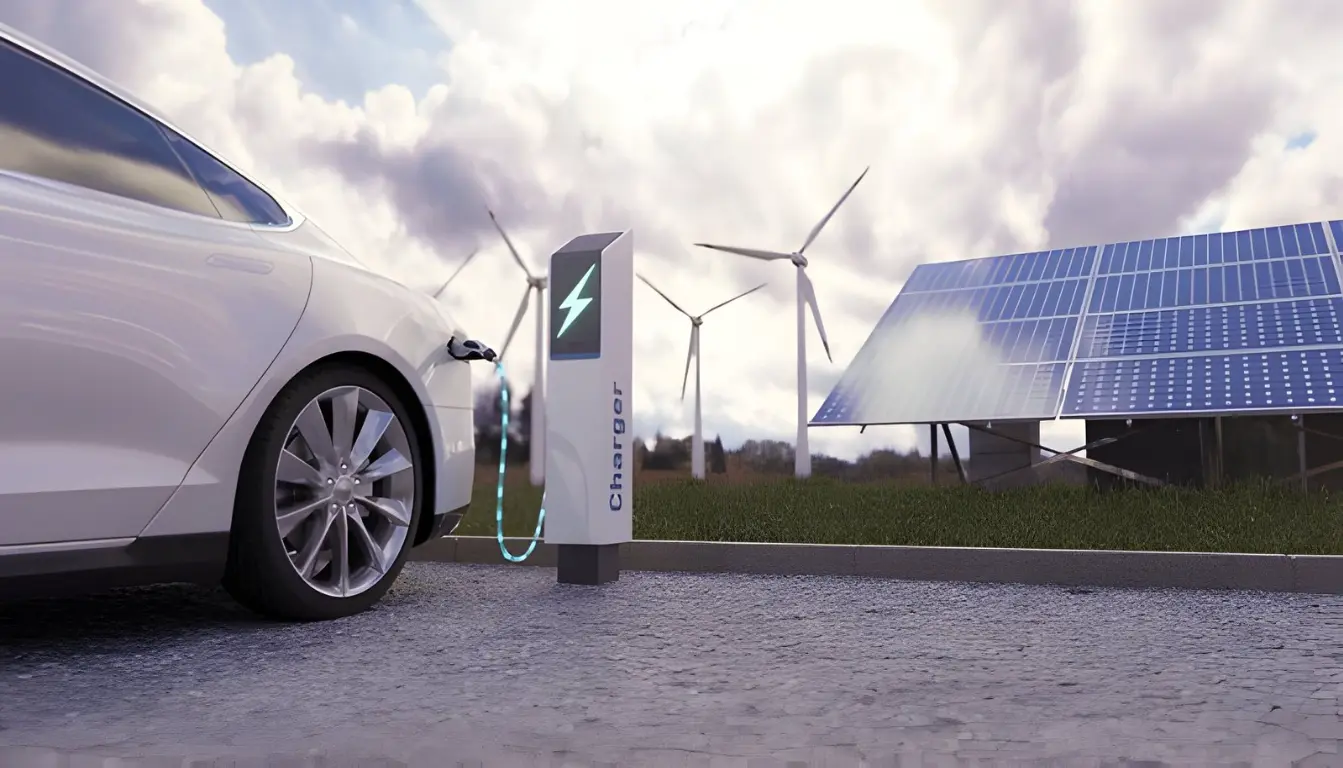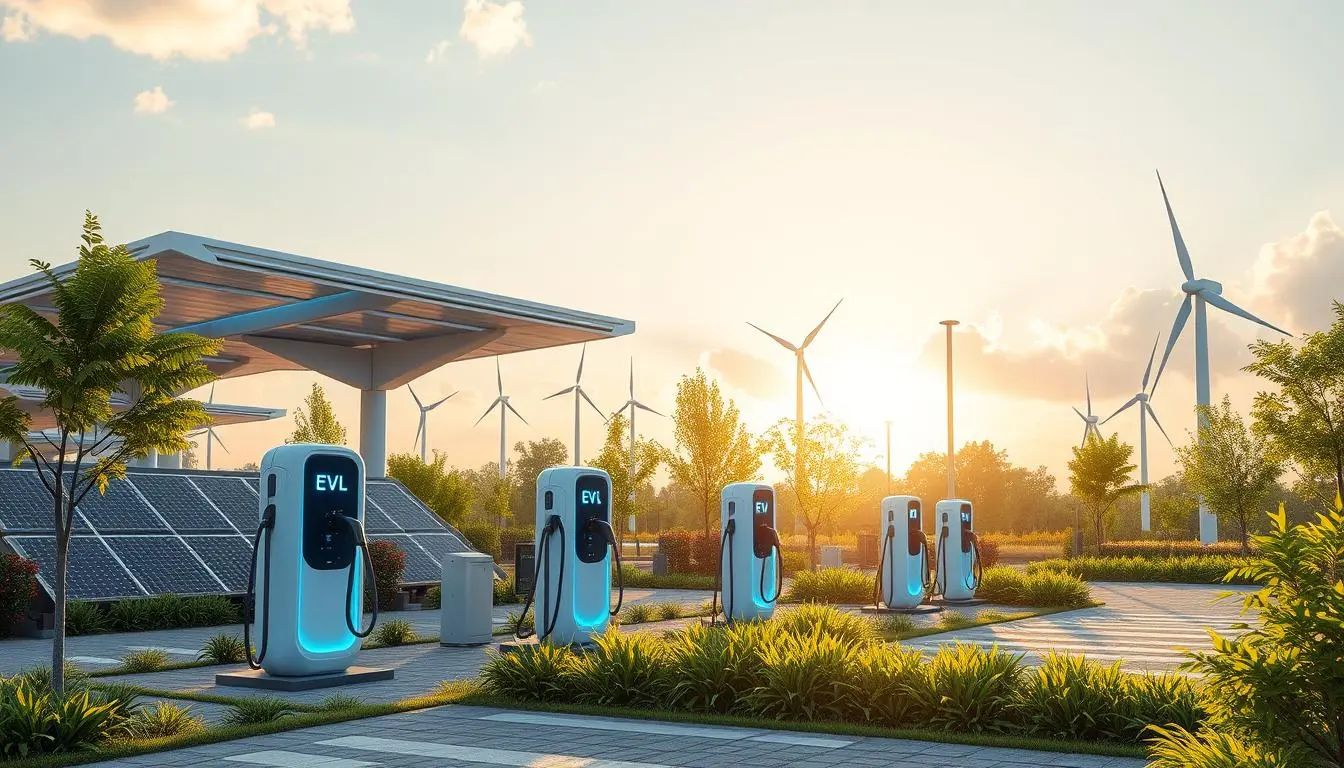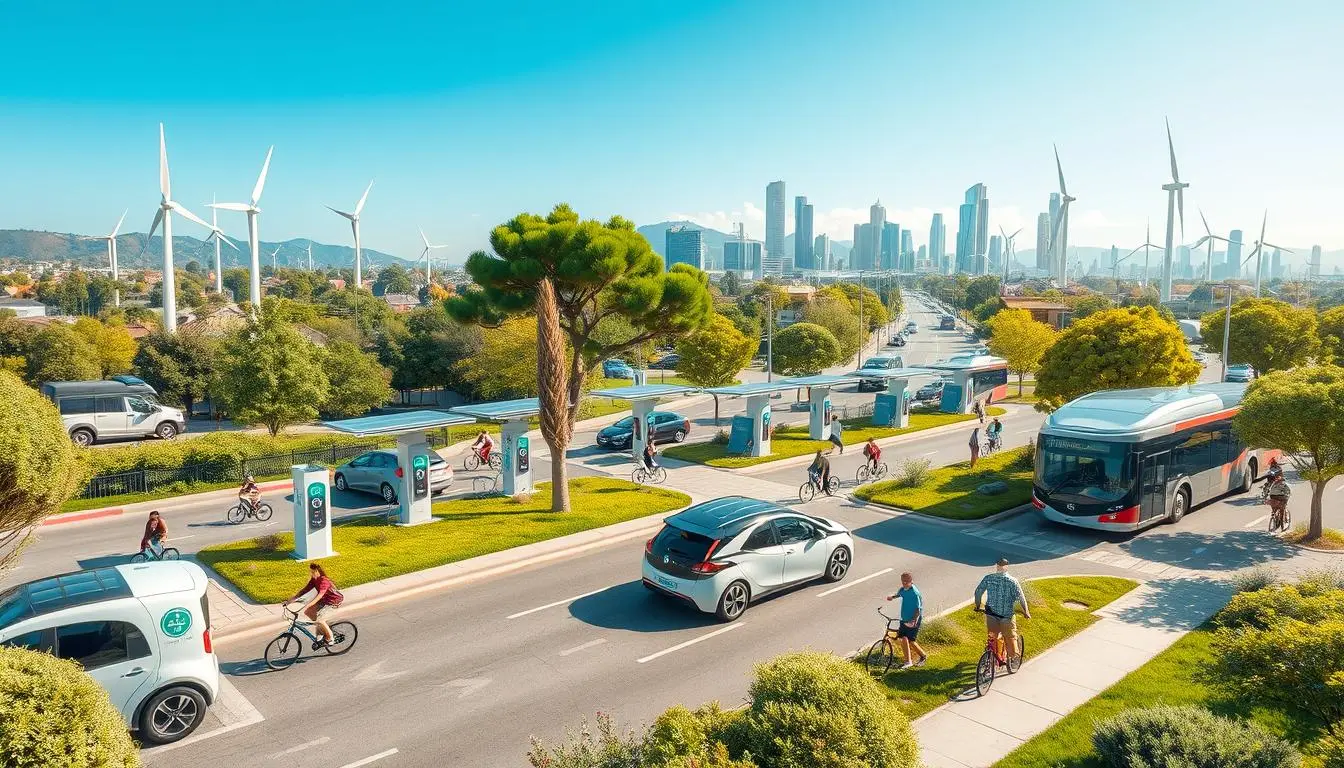
EV charging using renewable energy is becoming essential as the world shifts towards a greener future. This article explores the latest advancements in solar, wind, and smart grid technologies for EVs. However, the central question remains: how can renewable energy transform the future of sustainable transportation?
Key Takeaways
- Renewable energy like solar and wind is being used for EV charging. This makes transport more sustainable and eco-friendly.
- Smart grid tech and energy storage help use renewable energy for EV charging stations smoothly.
- Rules and cost analyses are important for making renewable EV charging common.
- Overcoming grid issues is essential for renewable EV charging to work well.
- The future of green transport depends on using renewable energy and EV charging together.
Integrating Renewable Energy Sources for EV Charging
The demand for electric vehicles (EVs) is growing fast. Using renewable energy for EV charging is key to sustainable mobility. Solar and wind power are leading the way.
Solar-Powered Charging Stations
Solar-powered charging stations use the sun’s clean energy for EV charging. They offer many benefits, including:
- Less carbon footprint by not using grid electricity
- More access in areas with poor grid
- Lower costs over time
- Works well during power outages
Wind Energy for EV Infrastructure
Wind power is also a great source for EV charging. It provides reliable, clean energy for electric vehicles. The main advantages are:
- Less use of fossil fuels and lower emissions
- More energy security and grid strength
- Works well with smart grid tech
- Cost-effective in windy areas
Using solar and wind for EV charging boosts sustainable mobility. It also helps with renewable energy goals and smart grid development. As tech improves, these solutions will be crucial for electric transport’s future.
| Renewable Energy Source | Key Advantages | Challenges |
|---|---|---|
| Solar-Powered Charging Stations |
|
|
| Wind-Powered EV Infrastructure |
|
|
EV charging using renewable energy technologies
The push for green transportation is growing fast. Using renewable energy for electric vehicle (EV) charging is key. This section looks at how to use solar and wind power for EV charging. It aims to make transportation cleaner and help us reach a sustainable future.
Solar-powered charging stations are a big step forward. They use the sun’s energy to charge EVs without pollution. By placing these stations well, EV drivers can easily charge their cars with clean energy. This helps reduce their carbon footprint and supports sustainable mobility.
Wind energy is also becoming important for EV charging. Wind farms and turbines can power EV charging. This method adds variety to renewable energy sources. It also helps solve problems with the grid and storing energy, which are big challenges for EV charging.
| Renewable Energy Source | Advantages for EV Charging | Challenges |
|---|---|---|
| Solar Power |
|
|
| Wind Energy |
|
|
Using renewable energy for EV charging is a big step towards a greener future. Solar, wind, and other clean energy sources help EV owners reduce their environmental impact. This move towards sustainability is crucial for our planet’s future.

“The transition to electric vehicles powered by renewable energy is not just a technological revolution, but a fundamental shift towards a more sustainable and environmentally conscious future of transportation.”
Smart Grid Technologies and Energy Storage Solutions
The world is moving towards renewable energy, making smart grid tech and energy storage key. They help integrate clean power for EV charging. This makes EV charging more sustainable and efficient.
Smart grid tech, like advanced meters and smart charging, changes how EVs are charged. It optimizes energy use, balances grid loads, and enables V2G. This lets EVs help the grid and offer services.
Energy storage is vital for renewable energy’s ups and downs. It pairs with EV charging stations to store excess energy. This ensures EVs get power when they need it, making charging reliable.
Together, smart grid tech and energy storage make EV charging better. They improve renewable energy integration and help smart grid technologies use energy wisely. They also support energy storage solutions for more electric cars.

“The future of electric vehicle charging lies in the seamless integration of renewable energy sources and advanced grid technologies.”
As EVs become more popular, these technologies will play a bigger role. They’re leading us to a greener, more efficient future in transportation.
Sustainable Mobility and Zero-Emission Transportation
The world is moving towards a greener future, and zero-emission transport is key. Electric vehicles (EVs) are at the forefront, using clean energy. Eco-friendly charging helps make our transport system more efficient and eco-friendly.
Eco-Friendly Charging Solutions
Solar and wind-powered charging stations are changing how we charge EVs. They cut down on carbon emissions and make charging easier for EV owners. This way, our cars run on clean, sustainable energy.
Grid Integration Challenges
Adding eco-friendly charging to our grid is a big challenge. It’s about balancing the power needed for EVs with the ups and downs of renewable energy. We need smart grid management to make sure our transition to green transport is smooth.
| Sustainable Mobility Indicator | 2020 | 2025 (Projected) |
|---|---|---|
| Percentage of EVs in the global vehicle fleet | 4.6% | 15.2% |
| Renewable energy share in EV charging infrastructure | 27% | 48% |
| Grid integration efficiency (load balancing and stability) | 72% | 88% |
The table shows we’re making progress in green transport. EVs and clean energy are on the rise. But, we still face big challenges in making our grid work with these changes.

Cost-Benefit Analysis and Regulatory Frameworks
Electric vehicles (EVs) are becoming more popular, leading to a focus on using renewable energy for charging. A detailed cost-benefit analysis looks at the economic and environmental benefits of this shift. It shows how moving to sustainable mobility and green transport is beneficial.
Using solar and wind power for EV charging can save money in the long run and help the environment. These renewable-powered charging stations cut down on greenhouse gas emissions. They also make the transport sector more sustainable. Governments’ support through incentives and policies is key to making these green solutions more appealing.
Lawmakers and industry leaders are teaming up to create rules that help EV charging go mainstream. They’re offering financial help, tax breaks, and other policies to encourage the use of renewable energy for charging. This effort is making the move to sustainable transport faster, leading to a cleaner and more efficient future.
FAQ
What are the benefits of using renewable energy technologies for electric vehicle (EV) charging?
Using renewable energy for EV charging cuts down on environmental harm and emissions. It makes the transportation sector more sustainable. Solar, wind, and other clean sources power EVs, making them eco-friendly.
How do solar-powered charging stations work for electric vehicles?
Solar-powered stations use PV panels to make electricity from sunlight. This clean energy charges EVs. They’re set up in places like parking lots, offering green charging options.
What role do wind energy technologies play in powering the electric vehicle charging infrastructure?
Wind turbines power EV charging stations. They generate electricity for charging EVs. This makes the charging network more diverse and sustainable.
How do smart grid technologies and energy storage solutions enable the integration of renewable energy for EV charging?
Smart grid tech and energy storage are key for using renewable energy for EVs. They manage energy flow and balance loads. Energy storage systems, like batteries, store and provide energy for EVs.
What are the key challenges in grid integration when using renewable energy for EV charging?
Integrating renewable energy with the grid is a big challenge. Issues like grid stability and the variable nature of renewables need solutions. Smart charging and energy storage help address these problems.
How does the use of renewable energy for EV charging contribute to sustainable mobility and zero-emission transportation?
Renewable energy for EVs is key to green mobility and zero emissions. It reduces the transportation sector’s environmental impact. This supports global efforts to combat climate change and improve air quality.
What are the regulatory frameworks and cost-benefit considerations for adopting renewable energy-powered EV charging?
Laws and incentives are important for renewable EV charging adoption. Governments offer policies and financial help. A cost-benefit analysis is needed to see if these solutions are worth it.